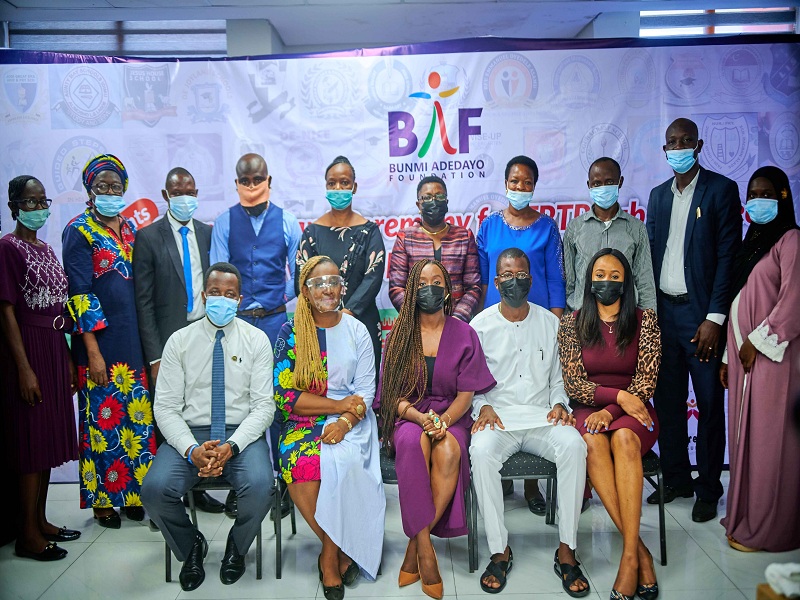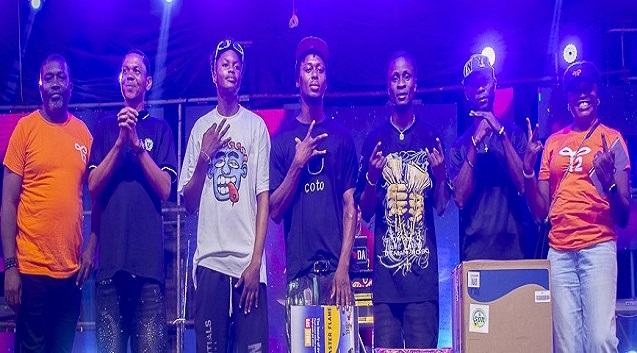Broadcasting
Coca-Cola and BAF’s Tech Relevant Teacher Project Ends With 24,000 School Pupils Impacted

The Tech Relevant Teacher (TRT) Project, an education intervention in Nigeria sponsored by The Coca-Cola Foundation, has come to a successful close.

??????????????????
The project, executed by implementing partners, Bunmi Adedayo Foundation (BAF), to ameliorate the impact of the COVID-19 pandemic on low- and middle-income schools through virtual teaching skills and tools training for school leaders and classroom teachers, concluded in June 2021.
Launched earlier this year, the Tech Relevant Teacher Project was developed following concerns around the increased digital divide in education, especially within low-income communities.
Multiple sources state that 25 million children in Nigeria were out of school due to the attendant effects of the pandemic, as the economic downturn disrupted the purchasing power of millions of families with fragile income streams.
As a result, the project focused on key activities and courses such as the School Leadership and Sustainability Conference (SLSC); 4-week Advanced Content Creation Classes held virtually; 8-Module Course on the BAF Learning Management System; 4-week Mentoring in Math and English Research; Pedagogy; Content Development and Advanced Content Digitization.
Through the TRT project, Coca-Cola sought to increase the digital learning competencies of teachers across select public and private schools in Nigeria.
The project, which spanned a seven-month period, recorded impressive numbers as over 24,000 children have been provided access to quality virtual education in their schools as a result of the training.
Additionally, 648 school leaders and classroom teachers drawn from 216 schools benefited from the intervention, as they attempted their first digital lessons enabled by over 2,000 hands-on interactive learning contents created in adaptive formats.
According to Nwamaka Onyemelukwe, director, Public Affairs, Communications & Sustainability, Coca-Cola Nigeria, the Tech Relevant Teacher Project could not have been initiated at a more opportune time as it significantly impacted the education sector in Nigeria.
“We could not be more delighted at the outcome of this project,” Nwamaka said.
“We were aware of the effects of the pandemic on access to quality education, especially within low-income communities and we decided to act. With support from our implementing partners, the Bunmi Adedayo Foundation, we are proud to have contributed significantly to closing the gap in education between underserved and privileged communities.
“Through our partnership, thousands of underserved children now have access to quality education while teachers have been empowered with relevant competencies in virtual teaching tools to facilitate quality education for years to come”, she concluded.
Other benefits available to beneficiaries of the initiative include the donation of 30 Computers, headsets with microphones and 30 PC External speakers to the 30 top-performing schools. BAF, however, maintains that the most celebrated outcome of the intervention is the production of several electronic preparatory courses in Mathematics and English for the Primary School Leaving Certificate Examination which will benefit thousands of students who wish to succeed at the Basic 6 terminal exams.
Femi Martins, programme director, Bunmi Adedayo Foundation, noted that the barrier between children in low-cost schools and other more advanced schools has now been significantly reduced as the Foundation seeks to “use technology to enhance learning and teaching for the underserved in Nigeria.”
Since its inception in 1984, The Coca-Cola Foundation has awarded over $1 billion in grants to support diverse sustainable community initiatives around the world.
Driven by a need to create a better-shared future for communities across the world, the foundation offers community support programs that have led to the improvement of the quality of life of these communities.
Broadcasting
DG NCC Tasks University Dons on Research Commercialization, IP Management to Build Global Competitive Ecosystems

Dr. John Asein, director-general, Nigerian Copyright Commission (NCC), has charged universities to leverage Intellectual Property (IP), innovation management and research commercialisation to build vibrant, sustainable and globally competitive ecosystems.

The DG stated this while delivering a paper on: ‘’Research Commercialisation, IP Policy and Innovation Management’’ at the Committee of Vice-Chancellors of Nigerian Universities (CVCNU) organised Business Clinic themed: Unlocking University-Driven Business Ecosystems: Innovation, Partnerships and Sustainable Enterprise Models in Abuja.
The programme was targeted at engaging Vice-Chancellors, principal officers and other key officers in Nigerian Universities in a practical dialogue on how to transit their institutions into thriving business ecosystems through innovation, enterprise development and strategic partnerships.
In his presentation, Dr. Asein, disclosed that Universities are now recognised as engines of national development and innovation hubs that must connect scholarship to business.
He noted that with over 300 Universities in Nigeria, there is need for structured pathways to turn ideas into commercial outcomes while attention should be focused on IP assets in our universities in order to harness them in a safe, sustainable and satisfactory manner.
The DG NCC speaking further on leveraging resources from the creativity locked up within the university system, harped on the need to harness the soft power of our youth as Nigeria’s most valuable natural resources are its people.
Drawing demography from Nigeria youthful population, he observed that over 70 percent of Nigerians who are under the age of 30 are mostly in the university system studying. These youths, he noted, shape cultures, technology and innovation through creativity and digital skills.
He tasked universities to become innovation factories where young people can explore ideas, protect their IP and grow startups by integrating innovation culture, entrepreneurship training and IP awareness into its learning environment.
He equally urged Universities to look beyond the sciences to commercialize traditional knowledge-based innovations and harness the potentials in the creative arts disciplines like music, visual arts, theatre arts and others for commercial outcomes.
Dr. Asein, recommended that universities as centres of learning, should take the lead in using the IP system for promoting education and learning, wealth creation, revenue generation and institutional development.
Underscoring the need for all universities to have an IP Policy, he noted that the Model developed by the Nigerian Copyright Commission in partnership with the CVCNU is a good starting point.
The Secretary-General, CVCNU, Prof. Andrew Haruna, presented the welcome address at the event while the Director, Technology Innovation and Commercialisation, NOTAP, Mrs. Adah H.N. Mokolo-Oladunke represented the Director-General, NOTAP at the event.
The 2025 CVCNU Business Clinic witnessed attendance from representatives of Public and Private Universities across the 36 States in Nigeria.
Broadcasting
US invests $115m in counter-drone tech for World Cup security


Drone
The US Department of Homeland Security (DHS) will invest $115 million in counter-drone technology to safeguard the 2026 FIFA World Cup and events marking America’s 250th independence anniversary, creating a dedicated office for rapid drone system deployment.
Homeland Security Secretary Kristi Noem described drones as “the new frontier of American air superiority,” stressing the need to counter threats from drug cartels using unmanned aircraft for smuggling and surveillance, alongside incidents like a 2025 NFL stadium drone flight and 2024 New Jersey sightings.
The funding supports 11 World Cup host cities expecting over one million visitors, building on FEMA’s $250 million grants to those states and addressing risks heightened by cartels’ advancing tech, including a reported FBI tracking plot in Mexico.
DHS has conducted over 1,500 counter-drone missions since 2018, with the new Program Executive Office accelerating acquisitions amid President Trump’s border security push.
Broadcasting
Youth Talent Takes Center Stage as T2 Ignites High-Octane Rap Battles @ Carnival Calabar

The energy at the Carnival Calabar Music Concert reached a new high as T2 introduced a first-ever rap battle platform, giving young Nigerians an electrifying stage to showcase their talent, creativity, and self-expression while competing for exciting prizes.

Held at the U.J. Esuene Stadium, the activation blended pulsating music, vibrant culture, and youthful energy into a dynamic celebration that kept thousands of carnival-goers fully engaged from start to finish.
Eight fearless contestants stepped into the spotlight, going bar for bar in an intense lyrical showdown. Rappers fused local languages, pidgin, and sharp punchlines, creatively weaving the T2 brand into their verses.
Anchored by the energetic hosting duo MC Double I and MC Princess, the rap battles thrilled over 16,000 attendees, including the Governor of Cross River State, Senator Bassey Otu, delivering an unforgettable showcase of youth talent and cultural expression.
With prizes including fridges, gas cookers, sound systems, and airtime top-ups, the competition remained fierce throughout the night. After two high-energy rounds narrowed the field to a five-man final duel, Emmanuel Eye emerged as the overall winner, taking home the grand prize — a fridge.
“I never expected this at all,” Emmanuel said. “I came to the concert like anyone else, and hearing about the T2 rap battle was a surprise. When I got the chance to perform, I just went for it. Being named the overall winner is amazing, and I’m grateful to T2 for creating this platform to showcase our talent.”
Beyond the stage performances, T2’s presence added a digital layer to the carnival experience. As part of its role as Digital Technology Partner of Carnival Calabar, the brand introduced the MyT2 App as a lifestyle companion, while also enabling line reactivations, airtime top-ups, and instant rewards for hundreds of attendees, blending technology seamlessly into the live celebration.
Commenting on the activation, Chinelo Manefo, Specialist, Events and Sponsorship at T2, said:
“The energy from both the rappers and the crowd was incredible. This platform reflects exactly what T2 aims to create — a celebration of youth, creativity, and culture, enhanced by technology that connects people and experiences. Seeing the audience so immersed shows how music and performance can empower the next generation.”
The Carnival Calabar Music Concert, headlined by Tiwa Savage, Timaya, and top local performers, was further energized by T2’s interactive rap battle platform. By blending music, culture, youth expression, and digital innovation, T2 reinforced its commitment to championing Nigeria’s next generation, giving young creatives a stage to shine while enriching how they experience the festival.

 E-Financial3 days ago
E-Financial3 days agoZenith Bank Gets Regulatory Approval for Full Takeover of Paramount Bank

 Telecom3 days ago
Telecom3 days agoNew Investment Fund Targets Acceleration of Emerging Technology in Nigeria

 E-Business3 days ago
E-Business3 days agoFirm Detected a Fivefold Surge in QR Code Phishing Attacks in the Second Half of 2025

 News3 days ago
News3 days agoNITDA Commits to Digital Inclusion for Persons with Disabilities

 General News2 days ago
General News2 days agoPalmPay User Shares Experience on Fintech Apps to Trust in Nigeria

 News2 days ago
News2 days agoStakeholders Demand Stronger Governance and Infrastructure to Drive Tech Adoption @ Lagos AI Summit

 General News2 days ago
General News2 days agoNigerians Target Self-Improvement, Business Startups in 2026 Google Data

 General News2 days ago
General News2 days agoHow Inside Jobs and Policy Shocks Trigger Nigeria’s Rising Loan Crisis

























